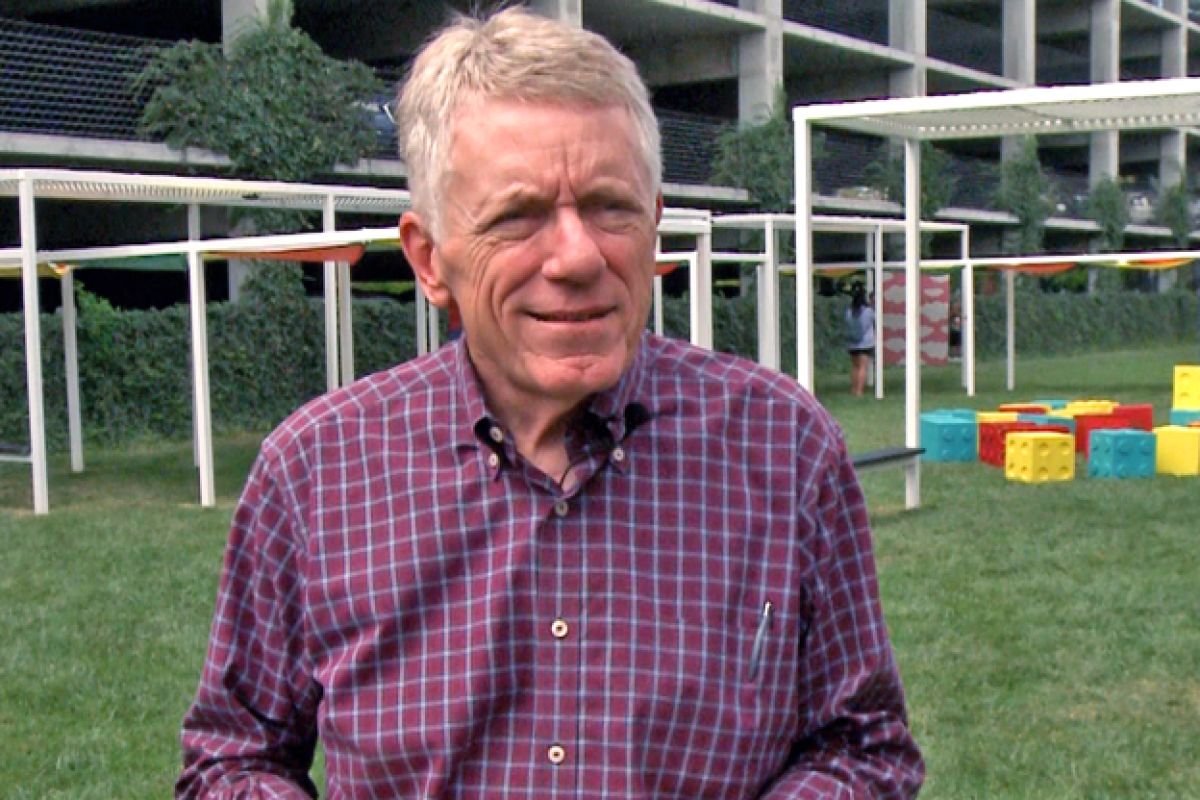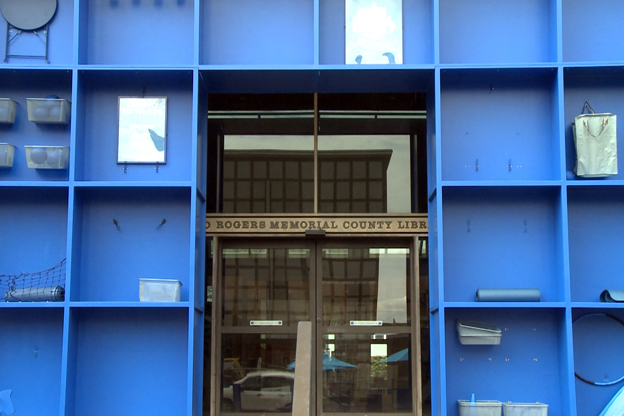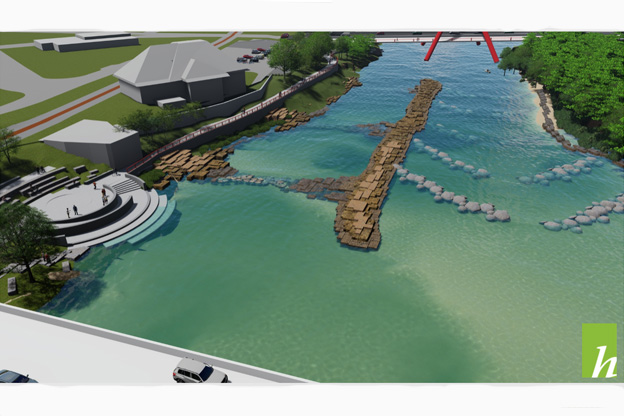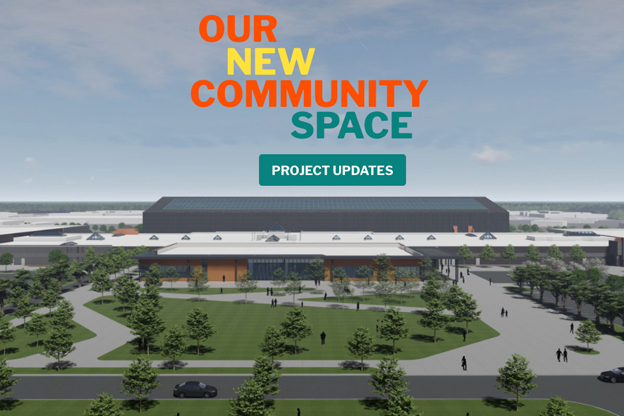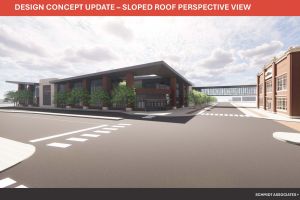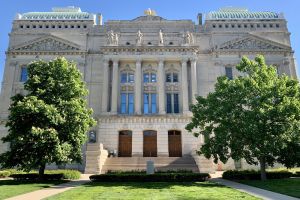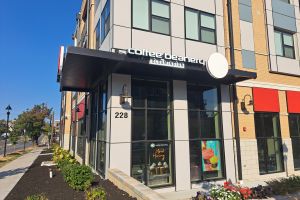Hello and welcome to ask the mayor on WFIU. I'm Joe Hren. First week of September. As always, I'm with Columbus Mayor Jim Lienhoop. We're outside you probably can hear the noise of a beautiful day in Columbus. Thank you for joining us outside at exhibit Columbus.
Speaker 2
You're very welcome. Joe, this is a great time to be in Columbus is a great time to just come walk around our downtown area. You know, behind us, we've got one of the installations this one from a high school design team. But just a fun, just a fun effort to you know, come and enjoy outdoors. Little bit interesting designs from different kinds of thoughts and just have a great day.
Speaker 1
So this year's exhibit, Columbus has a theme, right? Public by design. Yes, I believe. And you probably have a little bit of interest in that being you're the mayor of the city.
Speaker 2
Yeah, no, I mean, what we try to do with exhibit Columbus is to get entertained, but also challenged people a little bit just to give them something to think about. And at the same time, as I said, to entertain, or to show a little bit of excellence in design. So some really smart people have tried to figure out different ways to display the space or to use the space that we've got. And so we've got, I'll say, 14 installations around the downtown area. And it's just interesting to see what other people who are not from the area. See when they look at our open space, and what opportunities they see.
Speaker 1
How important is this to the city, what does exhibit Columbus bring to the city?
Speaker 2
Well exhibit Columbus does several different things for us. You know, part of what it does is it helps the residents who live here focus on our architectural legacy. I mean, it is something that really is important. But because we live with it, because we see it every day, it's also something to put in the back of your mind or even just just forget about. It also allows for others to come to Columbus and see what we have here. You know, building doesn't change too much. I mean, City Hall where I work was built about 40 years ago. And now it looks a lot like it did 40 years ago, but but we still invite people to come take a look at it. And part of what you need to be able to do is to keep your community fresh. And so every two years, we've got a little bit of a refresh on you know, downtown design here. So it does a couple of good things for some for residents, some for visitors.
Speaker 1
All right. Well, we do want to get to a couple of other items on the show today. We had our Indiana public broadcasting environmental reporter Rebecca Thiele ipbs report on the city shutting down a well rewriting some pee fast, toxic chemical, I saw a number of water suppliers actually in the state had levels that were higher than anyone would want. What's being done? Where's this right now?
Speaker 2
Okay, we've got three initiatives underway ones, short term ones, mid term ones long term, the short term is to shut down a couple of wells, we have about 30 wells here for the City of Columbus. And I want to say there was one that had a reading that was, you know, sort of an outlier, I mean, much higher 45 parts per trillion, let's say instead of non detect or a single digits. And so we think if we shut that one down, the average of the remaining will be below the proposed guidelines. And we've had some tests taken, the tests are at the lab, we should expect, we expect a result within a month. But it might be too, because when you're measuring parts per trillion, there's only two labs in the country. A trillion is one second out of 320 centuries. So think about that. I mean, that's how small you know, we're measuring here for in the public water supply. So we're going to shut down a well, we've already drawn samples to retest, we're waiting to get the results back from that. The second or the midterm response will be to drill some new wells. And you know, the the wells are significant in size of diameter. We've drilled some pilot tests some pilot wells to test what's down there in the aquifer, and the results have come back so far, I've been no detection, you know, so we think that we can bring some additional wells online, but that's going to take a few months to get all that taken care of long term. We will pursue activated charcoal to act as a filter and that will remove the pee fast. The PFS compounds will adhere to the charcoal and be removed from the drinking water. But that's going to take you no longer yet that may be I hate to put a number on it you know in turn As of months or years, but but it'll be out there a little bit a little ways. But immediately we're going to close down the offending wells, we're going to drill some new ones so that we think we can get our overall average below the proposed guidelines. And then long term, we aim for zero, which is the use of the activated charcoal. And that I guess, was really a force strategy, which is that we will pursue reimbursement for these costs from some of the manufacturers associated with these compounds. 3am and DuPont have already been engaged in litigation. And we intend to join that. And as I said, get some reimbursement for the costs that we will bear to respond to this
Speaker 1
was some good news about water. I read where the city received a certificate from IBM for a riverfront friend project, long term project. And but you'll take any good news you can get on? Well, absolutely,
Speaker 2
you know, there's several different hurdles that we have to cross in order to get to where we can did our riverfront project. And the IDM certification was one of them, we're now waiting for the Army Corps of Engineers to review that permit, make sure that it meets their standards, and then we hope to hear from them within another month or so.
Speaker 1
What's the so just to give people a little bit of background, what's the goal of this project goal
Speaker 2
of the riverfront project is to reimagine the river, we want to do three or four things there all at one time. And it's you know, maybe that's part of the issue is it's been a little ambitious. But if you're familiar with the people trail system here in Columbus, that's sort of the missing front tooth, I mean, it, it, we've got an area there between those Second and Third Street bridges that are where the people trails don't connect. And we want to be able to provide that connection at a different grade than the trucks, right? I mean, we don't want grandma and grandpa taking the stroller across the street, when there's a propane truck bearing down on it. At the same time, we've got a dam in there that is failing, you know, we want to take that out. But we want to have something that goes back in there that protects the wetlands, and the city park that's just upstream mill race Park is maybe a half mile, you know, just upstream from this dam site. In addition, we've got some erosion on both sides of the river one threatens to expose an old sewer pipe that sort of been taken out of service, but nonetheless, still needs to be protected. And then on the far side, or the I guess, would be the west side of the river. There's an old landfill, you know, that had been a brownfield site many years ago. And we'd really like for it to stay kept, you know, we don't want the river coming through and eroding the cap that's on top of that. So we've got several different perspectives on this river that we want to try to address and, and it's at the Capstone, or maybe not Capstone is probably not the right word. But we would also like to be able to provide some kind of recreational opportunity for people as we have talked to particularly younger folks who consider Columbus as a home, you know, part of what they want are outdoor recreational opportunities, and in particular in water types. And so we feel like we've got an opportunity to provide that here. And we're going to do this might as well do it all at once, get it done with and, you know, have something that we can enjoy. The current dam is about 100 years old. So, you know, we're hoping for another 100 With the new one.
Speaker 1
Saw report in the Republic, the commons board has a new set of rules after experiencing some camping sleeping at the commons, it caught my eye because Bloomington just passed ordinances to banning tents overnight now daytime being people sleeping off sidewalks. You know, we're talking about people, though, who are experiencing homelessness, right?
Speaker 2
Well, they're experiencing a lot more than homelessness. I mean, for people who are only homeless, you know, we have some excellent options for those folks. There's a homeless shelter here called brighter days, that will give them temporary housing. We've got educational programs, we've got some work programs, the people who run that will get the individuals who are experiencing Oh, my homeless, connected with a rate with a way to how do you want to phrase this rebuild their lives. And so we're happy to do that. And we feel like that's some of the compassion that we're supposed to show as a community and that we're trying to help these folks through a tough time. The issue that we have down the comments and if there and most other city parks, is people who are also homeless, but also subject to some mental illness, and some substance abuse disorder. And those folks have, we have the same programs for to them, but they are a little less receptive, you know, for that kind of assistance, and they want to be able to sleep or they want to sleep and lounge where they want to lounge and, you know, do whatever else comes to their mind. And it interferes with the quiet enjoyment of those parks by other residents. And that's the sort of the tension, you know, that is come here. And so what we're trying to do is to explain to all folks, the the minimum standards for use of a park you know, you're welcome here, but you can't Live here, you know, you can't stay here, you got to keep moving on. And so the first step was down with the comments to pass a set of rules so that everybody knows is clear, we can post it. And everybody can see, you know, what the expectations are. And then based upon how that works, I anticipate that we'll roll this out to other city parks as well.
Speaker 1
Now we got to get going, but I wanted to get a quick update on the Nexus Park. I know that rattle on last month,
Speaker 2
yeah, it's exciting. I mean, we got baby skin, the facility or pretty much, you know, put the exterior skin on there, they're doing the floor. You know, it's a, it's hard to imagine a piece of concrete that big that flat. But that's, that's what the challenge has been. That's what they've got to do or the contractors. But it's on schedule, we're thinking that we'll have what I call a ticketed event, you know, a pain event sometime in the second quarter of 2020. For right now, we're kind of focused on the south side of the building, which is where the Parks Department will move where the community spaces will be. But we anticipate having four grand openings out there, I mean, the place is that big, there's that much going on CRH when it opens its clinic, we will have a grand opening for it. We'll have one for the Fieldhouse, one for the parks and community spaces, it'll be on the south end of the building. And then we'll have a fourth one for the landscape. You know, once all the interior work is done, then we'll finish off the parking lot. There'll be a little park a green space, you know, to the to the south side of the building. And that's appropriate lighting and all that kind of stuff. So it's going to be fun, and there's plenty to enjoy. So just stay tuned.
Speaker 1
Thank you so much for coming out here today. Hot day but it's nice to be out. Isn't I love
Unknown Speaker
this. Yeah.
Unknown Speaker
Thank you. We'll see you next time. Take care







